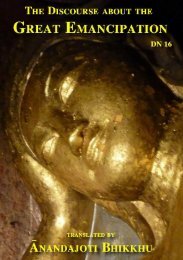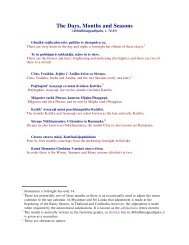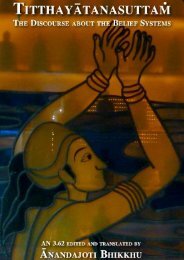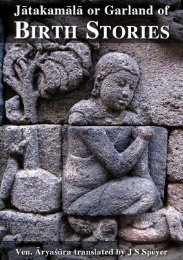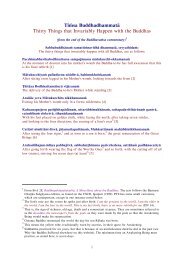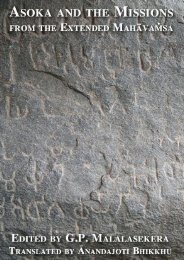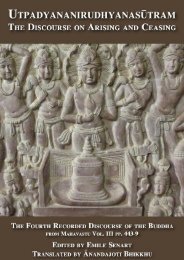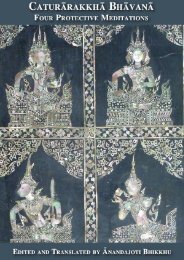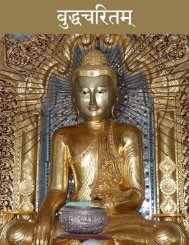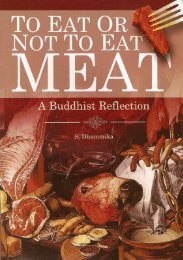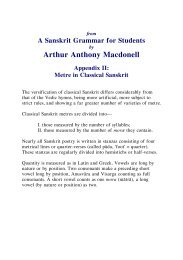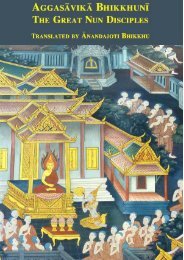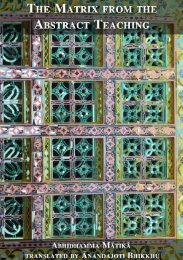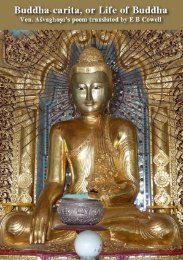Mahaparinibbanasuttam (DN 16) - Ancient Buddhist Texts
Mahaparinibbanasuttam (DN 16) - Ancient Buddhist Texts
Mahaparinibbanasuttam (DN 16) - Ancient Buddhist Texts
You also want an ePaper? Increase the reach of your titles
YUMPU automatically turns print PDFs into web optimized ePapers that Google loves.
The Fifth Chapter for Recitation - 185<br />
“Kathaṁ pana Bhante Tathāgatassa sarīre paṭipajjitabban.”-ti<br />
“How should we act, reverend Sir, in regard to the Realised One’s body?”<br />
“Yathā kho Ānanda Rañño Cakkavattissa sarīre paṭipajjanti,<br />
“As you act in regard to the Universal Monarch’s body,<br />
evaṁ Tathāgatassa sarīre paṭipajjitabban.”-ti<br />
so you should act in regard to the Realised One’s body.”<br />
“Kathaṁ pana Bhante Rañño Cakkavattissa sarīre paṭipajjantī?” ti<br />
“But how do they act, reverend Sir, in regard to the Universal Monarch’s body?”<br />
“Rañño Ānanda Cakkavattissa sarīraṁ ahatena vatthena veṭhenti,<br />
“They wrap the Universal Monarch’s body, Ānanda, with clean cloth,<br />
ahatena vatthena veṭhetvā vihatena kappāsena veṭhenti,<br />
and after wrapping with clean cloth, they wrap with carded cotton,<br />
vihatena kappāsena veṭhetvā ahatena vatthena veṭhenti,<br />
and after wrapping with carded cotton, they wrap with clean cloth,<br />
etenupāyena pañcahi yugasatehi Rañño Cakkavattissa sarīraṁ veṭhetvā<br />
by this means after wrapping the Universal Monarch’s body with five-hundred pairs (of<br />
cloth and cotton),<br />
āyasāya teladoṇiyā pakkhipitvā, aññissā āyasāya doṇiyā paṭikujjetvā,<br />
enclosing it in an oil tub made of iron, 217 and enclosing it in another iron tub,<br />
sabbagandhānaṁ citakaṁ karitvā, Rañño Cakkavattissa sarīraṁ jhāpenti,<br />
and putting it on a scented funeral pyre, they burn the Universal Monarch’s body,<br />
cātummahāpathe Rañño Cakkavattissa thūpaṁ karonti.<br />
and they build a Shrine for the Universal Monarch at the crossroads.<br />
Evaṁ kho Ānanda Rañño Cakkavattissa sarīre paṭipajjanti,<br />
So they act in regard to a Universal Monarch’s body,<br />
yathā kho Ānanda Rañño Cakkavattissa sarīre paṭipajjanti<br />
and as they act in regard to a Universal Monarch’s body<br />
evaṁ Tathāgatassa sarīre paṭipajjitabbaṁ,<br />
so should they act in regard to a Realised One’s body,<br />
217 The Commentary defines iron as gold here: āyasāyā ti sovaṇṇāya, sovaṇṇañ-hi idha ayasan-ti<br />
adhippetaṁ; made of iron means made of gold, because here gold is meant when iron (is said). It<br />
may be, as Rhys-Davids believes (p. 155 n.4), that iron was not thought of as being a sufficiently<br />
valuable metal by the time the Commentaries were being written. I can find nowhere else where<br />
āyasa is defined as gold, and so let the translation as iron stand.



